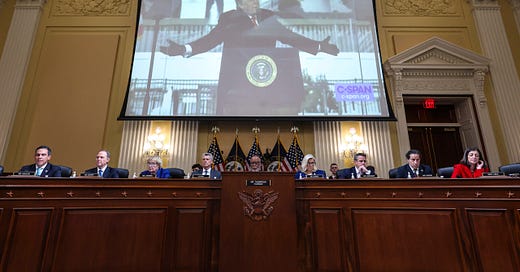
The January 6th Committee Subpoenaed Trump. Now What?
Our democratic system may not be capable of defending itself against a lawless president.
Former President Donald Trump is not likely to comply with the subpoena that the January 6th Committee issued for him. The subpoena expires at the end of this Congress. And while Trump’s (presumed) refusal to cooperate is an essential part of the factual record this committee is establishing for the public, it also underscores how inept our democratic system is at confronting a lawless (former) president.
Over the last year, the committee compiled a damning record of evidence demonstrating Trump’s responsibility for the attack on the U.S. Capitol on January 6, 2021. This evidence took the form of contemporaneous records, criminal legal findings, and sworn testimony. Nearly all of the sworn testimony came from Trump’s own staff. The committee aired those findings through a series of plain-spoken, well-constructed public hearings. In response, Trump hasn’t even attempted to defend himself on the merits of the case. Instead, Trump has opted to attack the committee with all manner of smears, conspiracies, and lies, none of which are fundamentally different from the smears, conspiracies, and lies he has trafficked in for the whole of his journey through the American political system.
Now what? Is that it? Where do we go from here?
Here’s what is known: The committee will issue a final report documenting its findings and issuing legislative recommendations for Congress to consider as a means to prevent another January 6. Committee vice chair Liz Cheney also says, “We have sufficient information to consider committee referrals” to the Department of Justice. She referenced Roger Stone, Mike Flynn, John Eastman, Jeffrey Clark, Mark Meadows, and Steve Bannon as persons the Department of Justice might be able to pursue so as to uncover facts these men hid from the committee. (Bannon has already been found guilty by a jury of two charges of contempt of Congress and will be sentenced later this month.)
So, as the committee finishes its work, all eyes will turn to Attorney General Merrick Garland. To date, more than 800 individuals in all 50 states and the District of Columbia have been arrested for crimes related to the attack on the Capitol. None of the political figures responsible for inciting the attack are included in that roster.
During the committee’s final public hearing, Cheney seemed to address the attorney general directly in her remarks: “[T]he violence and lawlessness of January 6th was unjustifiable, but our nation cannot only punish the foot soldiers who stormed our Capitol,” she said. “Those who planned to overturn our election and brought us to the point of violence must also be accountable.”
Garland has described the Department of Justice’s ongoing criminal probe into January 6th as the “most wide-ranging investigation in its history,” and has promised to “hold accountable anyone who was criminally responsible for attempting to interfere with the transfer, legitimate, lawful transfer of power from one administration to the next.”
Two former Trump officials—Marc Short and Kash Patel—were spotted at the federal courthouse where a grand jury is investigating the attack on the Capitol. But unless the Department of Justice delivers an indictment, the public will be mostly in the dark about how this investigation is progressing.
Thanks to the January 6 Committee, however, there are more knowns than unknowns about Trump’s responsibility for the attack. Namely:
Trump’s premeditated plan to declare the election stolen
His awareness that there was no evidence of fraud
The pressure campaign he exercised on federal, state, and local officials to investigate and overturn the results
His knowledge that the mob he summoned was armed
Still, even with all this evidence, nothing has really changed. No significant penalties have been inflicted on the members of the political class who were responsible for the insurrection.
Cheney got to this unsettling reality in her remarks:
This leads us to a key question: Why would Americans assume that our Constitution and our institutions in our Republic are invulnerable to another attack? Why would we assume that those institutions will not falter next time? A key lesson of this investigation is this: Our institutions only hold when men and women of good faith make them hold, regardless of the political cost. We have no guarantee that these men and women will be in place next time. Any future president inclined to attempt what Donald Trump did in 2020 has now learned not to install people who could stand in the way.
One doesn’t need to imagine someone other than Trump trying. He could again. He remains favored as the 2024 GOP presidential nominee. He promises to pardon his violent supporters who attacked the Capitol. That’s Donald Trump’s vision of justice for January 6th.
If our system is going to hold him accountable, it better get to work. Because it’s running out of time.











